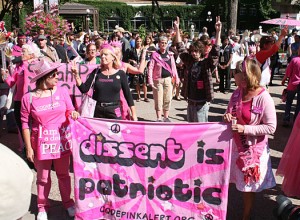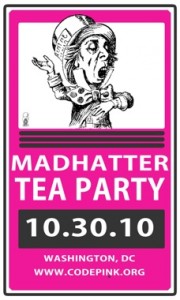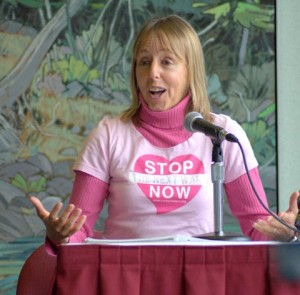 The following article by Global Exchange and Code Pink Co-founder Medea Benjamin also appeared on AlterNet.org.
The following article by Global Exchange and Code Pink Co-founder Medea Benjamin also appeared on AlterNet.org.
—
As long as people keep organizing and mobilizing, there will be victories to celebrate.
This year was marked by turmoil at home and abroad, including a deepening financial crisis that continues to leave millions jobless and homeless, as well as ongoing and expanding wars. But despite the setbacks and disappointments, here is a list of victories to be thankful for, starting with three inspirational women.
1. On November 13, Nobel Peace Prize winner Aung San Suu Kyi was released from house arrest. In 1990 her party, the National League for Democracy, won the elections but the military junta refused to let them take power. Instead, Suu Kyi was kept under house arrest for almost 15 of the last 21 years. Her release brings great joy and hope to millions of people in Burma and supporters of democracy worldwide.
2. Dilma Rousseff was elected president of Brazil and takes power on January 1. Dubbed by the media “the most powerful woman in the world,” Rousseff was tortured and jailed for three years for opposing Brazil’s military dictatorship. She later became Chief of Staff for the popular outgoing president and former metalworker, Lula da Silva, whose policies of growth with equity have helped pull millions of Brazilians out of poverty. While some worry about Rousseff’s commitment to the environment (she was also Lula’s Energy Minister), the fact that a progressive woman from the Labor Party will rule a powerhouse like Brazil is cause for celebration.
3. Elizabeth Warren became “consumer czar.” After the financial meltdown in 2008, Warren was appointed Chairwoman of the five-member Congressional Oversight Panel created to investigate the banking bailout and oversee TARP. She won tremendous public support by sharply criticizing the banks and calling for greater transparency and accountability. Warren advocated for a Consumer Financial Protection Bureau to protect borrowers from abuses in mortgages, credit cards and other consumer loans. On September 17 President Obama named her special adviser by to oversee the development of this new bureau.
4. The Nobel Peace Prize was awarded to Chinese literary critic and professor Liu Xiaobo. Liu, a critic of China’s one party state, was sentenced to 11 years in prison for drafting a petition calling for free speech and open elections. The Chinese government usually escapes rebuke for its oppressive practices because the country is such an economic superpower. However, according to Amnesty International, some 500,000 Chinese prisoners are in detention without charge or trial. Harassment, surveillance, house arrest, and imprisonment of human rights defenders are on the rise, as is Internet and media censorship, and repression continues for Falun Gong practitioners and minority groups, including Tibetans, Uighurs and Mongolians. The Nobel Prize for Liu Xiaobo has helped expose China’s dirty secrets.
5. Speaking of exposing secrets, WikiLeaks has sent shock waves around the world by exposing the inner machinations of U.S. foreign policy. After a decade of illegal wars, lack of accountability, government secrecy and embedded journalists, WikiLeaks has given the public a much-needed look at the way the U.S. government continues–under President Obama–to cajole, bribe and strong arm other nations into supporting U.S. policies. We look forward to more revelations in 2011 and we hope more people will step forward to defend WikiLeaks and suspected whistleblower Bradley Manning!
6. Don’t Ask Don’t Tell was repealed. The LGBT community has been fighting to repeal Don’t Ask Don’t Tell since it was first introduced as a compromise measure by President Clinton in 1993. In an historic Senate vote on December 18 the policy was repealed and then signed by President Obama on December 22. While some find it hard to celebrate the ability of more people to now fight in U.S. wars, let’s remember that this victory will help the gay community win upcoming, more important struggles for marriage rights and equality in the workplace.
7. U.S. troop levels in Iraq declined dramatically. While President Obama has presided over a disastrous surge of troops in Afghanistan, he does seem to be holding to his promise of ending the U.S. military presence in Iraq. The number of U.S. troops has declined from some 144,000 in January 2009 to roughly 50,000 today. The remaining troops are supposed to leave the country by the end of 2011, and many worry they will be replaced by private contractors. The U.S. invasion of Iraq, based on lies and resulting in the death and displacement of millions of Iraqis, is one of the most shameful episodes in our history. The sooner it ends, the better.
8. The health care bill passed. No, it was not a single payer bill and it didn’t even have a public option, disappointing many of its original supporters. But the bill does extend health coverage to over 30 million Americans who would have otherwise been uninsured; it stops private insurance companies from rejecting people for preexisting conditions; and it allows children to remain covered by their parents’ insurance until the age of 26. Taken as a whole, it represents a progressive shift in U.S. social policy, which is why it is being so viciously attacked by the right. And from the left, the fight for a single payer system, especially on the state level, is far from over!
9. The Senate ratified the New Strategic Arms Reduction Treaty (START) between the U.S. and Russia. The New START provides modest reductions in the number of deployed strategic nuclear weapons, and includes monitoring and verification procedures. Unfortunately, to get Republican support the U.S. commitment to disarmament is countered by a new commitment to spend $180 billion over 10 years to “modernize” U.S. weapons and delivery systems. But not passing the treaty would have been disastrous. The new treaty will undoubtedly improve U.S.-Russia relations and will hopefully move us closer to the eventual elimination of nuclear weapons.
10. In a little noticed automobile obituary, the last Hummer rolled off the production line on May 24–a casualty of higher gas prices, the economic crunch and a shift in consumer preferences. The cool cars of today are no longer monstrous gas guzzlers but hybrid and electric cars. There are 28 hybrid models already on the market today. At least 12 plug-in electric cars are planned for 2011, kicking off a wave of new green vehicles.
And a few extras for good cheer:
11. At the White House Tribal Nations Conference on December 15, President Obama announced that the United States would support the UN Declaration on the Rights of Indigenous Peoples. The statement is significant because the United States was one of only four countries that voted against the declaration when the UN General Assembly adopted it in 2007, and the last of those four to have reversed its former opposition.
12. In a policy reversal after the BP oil disaster, the Obama administration announced that it will not allow offshore oil drilling in the eastern Gulf of Mexico or off the Atlantic coast for at least seven more years. Meanwhile, offshore wind power is taking off from Maine to Georgia.
13. Foreign private security contractors were banned by the governments of Iraq and Afghanistan, and Blackwater founder Eric Prince–hounded by lawsuits and bad press–felt compelled to sell the company and move out of the country.
14. Thanks to California’s Proposition 19, also known as the Regulate, Control & Tax Cannabis Act, the debate on failed Marijuana Prohibition has arrived! Despite not passing, 4 million people voted to control and tax marijuana, with endorsements coming from new allies from the SEIU to the NAACP to law enforcement groups.
15. The government-supported student loan program was dramatically restructured, eliminating private banks and thereby ensuring that more money goes directly into the hands of low-income students.
I could keep the list going. It’s an important reminder, as we go into what will be a very difficult new year, that people on all continents continue to struggle for a more peaceful, just, sustainable world. And as long as people keep organizing and mobilizing, there will be victories to celebrate.

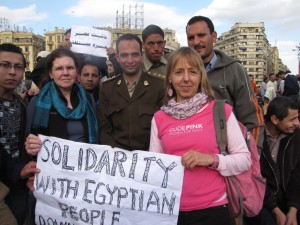
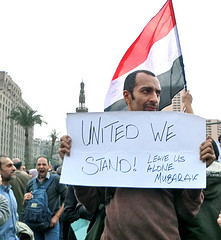 DayofMobilization in San Francisco, Sat. Feb. 5th, 2011, 1 pm at the U.N. Plaza, Market and 8th, San Francisco, CA. More info on
DayofMobilization in San Francisco, Sat. Feb. 5th, 2011, 1 pm at the U.N. Plaza, Market and 8th, San Francisco, CA. More info on 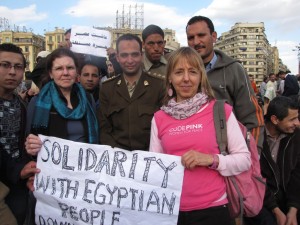 Egyptian protesters have poured into the streets this week calling for President Hosni Mubarak to step down by Friday, the people’s deadline. Global Exchange stands in solidarity with the people of Egypt, and we’re calling on the US Government to support the peaceful and immediate end to the Mubarak regime.
Egyptian protesters have poured into the streets this week calling for President Hosni Mubarak to step down by Friday, the people’s deadline. Global Exchange stands in solidarity with the people of Egypt, and we’re calling on the US Government to support the peaceful and immediate end to the Mubarak regime.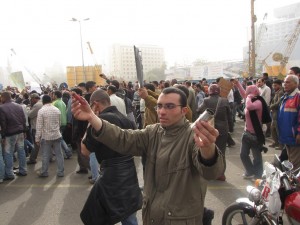 Medea has been emailing updates when she can. Since her earlier post
Medea has been emailing updates when she can. Since her earlier post 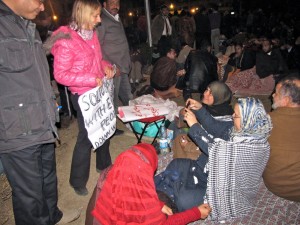 I couldn’t believe that after today’s attacks, there were still women in the square who planned to spend the night. A group of young women ran up to us and started hugging and kissing us. “You don’t know what your presence means to us,” one of the students said. “Please tell Obama that we need him to do more to push Mubarak to go NOW, before more of us get killed.”
I couldn’t believe that after today’s attacks, there were still women in the square who planned to spend the night. A group of young women ran up to us and started hugging and kissing us. “You don’t know what your presence means to us,” one of the students said. “Please tell Obama that we need him to do more to push Mubarak to go NOW, before more of us get killed.”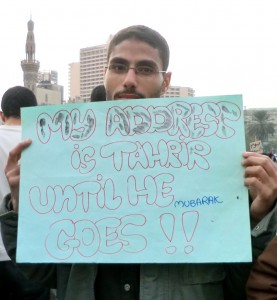 From Medea’s press release today:
From Medea’s press release today: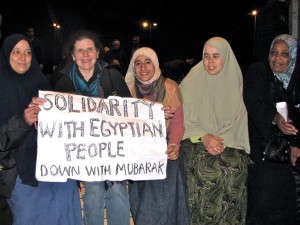 The Time is Now to Show Your Support!
The Time is Now to Show Your Support!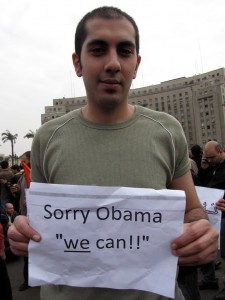 Here are ways you can stand in solidarity with the Egyptian people
Here are ways you can stand in solidarity with the Egyptian people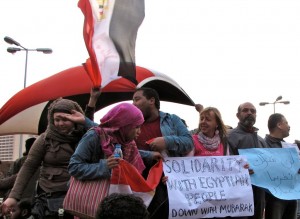 enjamin is cofounder of CODEPINK and Global Exchange. She can be reached for interviews in Cairo at (20) 107148431.
enjamin is cofounder of CODEPINK and Global Exchange. She can be reached for interviews in Cairo at (20) 107148431.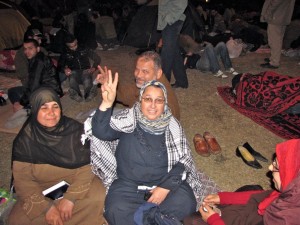 The main square in Cairo—Tahrir Square—is the headquarters of the revolution. Hundreds of thousands of people clogged the square today, and thousands have been camping out all week and insist they will stay until Mubarak leaves. They are young and old, mostly men but a surprising number of women and children. They are professionals and farmers, well off and poor, urban and rural, PhDs and barely literate. Some are long-time political activists who have been jailed by the regime; most have never engaged in anything political.
The main square in Cairo—Tahrir Square—is the headquarters of the revolution. Hundreds of thousands of people clogged the square today, and thousands have been camping out all week and insist they will stay until Mubarak leaves. They are young and old, mostly men but a surprising number of women and children. They are professionals and farmers, well off and poor, urban and rural, PhDs and barely literate. Some are long-time political activists who have been jailed by the regime; most have never engaged in anything political.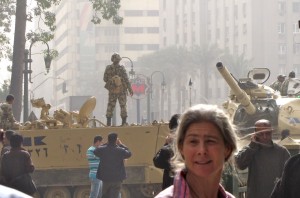 Army tanks line the entrance to the square, but a cordon of civilians separate the army from the protesters. Civilians also set up a 24-hour security detail to check people coming in—men frisk the men to make sure they have no weapons; women inspect the women’s belongings. The young people have organized clean-up crews, collecting garbage, sweeping, holding signs encouraging people to put their trash in the bins. A group of volunteer health workers in white coats walk around taking people’s blood pressure and checking up on their health.
Army tanks line the entrance to the square, but a cordon of civilians separate the army from the protesters. Civilians also set up a 24-hour security detail to check people coming in—men frisk the men to make sure they have no weapons; women inspect the women’s belongings. The young people have organized clean-up crews, collecting garbage, sweeping, holding signs encouraging people to put their trash in the bins. A group of volunteer health workers in white coats walk around taking people’s blood pressure and checking up on their health.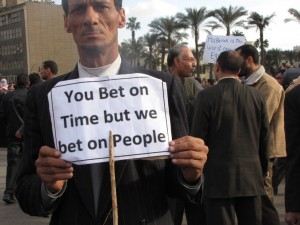 Circles of people gather to recite poetry, play music or sing. Others march round and round chanting “Down with Mubarak, down with Mubarak.” They hold handmade signs with all kinds of slogans. While mostly in Arabic, some signs in English say things like “Christians and Muslims, together against Mubarak” and “USA, Stop supporting Mubarak; We don’t wanna hate the USA.”
Circles of people gather to recite poetry, play music or sing. Others march round and round chanting “Down with Mubarak, down with Mubarak.” They hold handmade signs with all kinds of slogans. While mostly in Arabic, some signs in English say things like “Christians and Muslims, together against Mubarak” and “USA, Stop supporting Mubarak; We don’t wanna hate the USA.”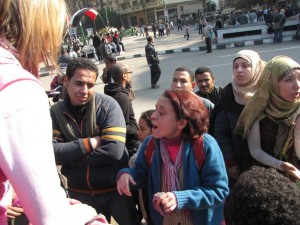 Everywhere, people are engaged in animated political discussions about their nation’s future. Some support Nobel Peace Prize winner Mohammad El Baradei as an interim leader. Others believe he is too far removed from the people, since he has lived abroad for 30 years, and they prefer a collective, interim government to write a new constitution and hold free and fair elections. Religious men with long beards, aligned with the Muslim Brotherhood, argue that Egypt needs a Muslim government; others disagree vehemently, insisting on a secular state. The discussions are passionate, but also friendly and respectful.
Everywhere, people are engaged in animated political discussions about their nation’s future. Some support Nobel Peace Prize winner Mohammad El Baradei as an interim leader. Others believe he is too far removed from the people, since he has lived abroad for 30 years, and they prefer a collective, interim government to write a new constitution and hold free and fair elections. Religious men with long beards, aligned with the Muslim Brotherhood, argue that Egypt needs a Muslim government; others disagree vehemently, insisting on a secular state. The discussions are passionate, but also friendly and respectful.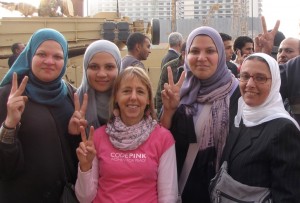 No matter how the situation in Egypt unfolds, a new nation has been born. Ordinary people are doing extraordinary things. They have overcome their fears and regained their dignity. They are writing their own destiny.
No matter how the situation in Egypt unfolds, a new nation has been born. Ordinary people are doing extraordinary things. They have overcome their fears and regained their dignity. They are writing their own destiny.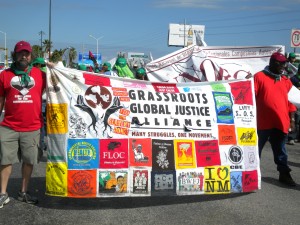
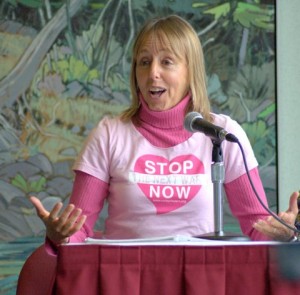



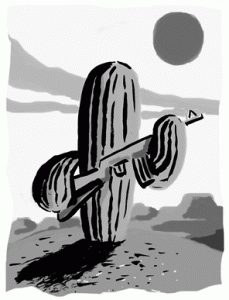
 The following article by Global Exchange and Code Pink Co-founder Medea Benjamin also appeared on
The following article by Global Exchange and Code Pink Co-founder Medea Benjamin also appeared on 